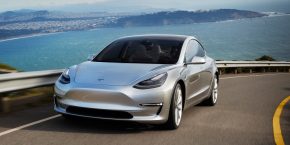
Tesla is making a push toward fleet vehicles as cost of operation reaches a tipping point for electric vehicles — led by the Model 3.
Model 3 is starting to make waves in the corporate fleet world.
A lot of fleet managers who are running the numbers are starting to realize that the electric vehicle offers some significant advantages.
Range has long been a limiting factor for corporate fleets to go electric, but Model 3 and several EVs have made this a thing of the past.
eIQ Mobility, a data science startup that has been working with Tesla to convince fleets to go electric, has been presenting a new standard metric, the EV Design Mileage, to determine whether an EV’s range can satisfy the daily operational requirements of an existing ICE vehicle.
The EV Design Mileage considers the following:
- Distribution of daily mileage of the ICE vehicle (typically over the course of one year)
- ICE vehicle idling
- Lower battery performance in extremely hot or cold climates
- The use of heating and air conditioning for passenger comfort
The company is using electric vehicles that they believe have sufficient range under those circumstances:
For example, 89% of eIQ passenger cars have an EV Design Mileage less than 310 miles, the range of the Model 3 Long Range. Our analysis shows that 93% of eIQ passenger cars have an EV Design Mileage that an available EV can satisfy. This demonstrates that almost all passenger car fleet vehicles that we have studied can be electrified without changing their driving habits.
Here are some of the stats on the EVs used by eIQ Mobility:
When fleet managers figure out that the range is sufficient, they start running the numbers and figure out that gas and maintenance savings make going electric a no-brainer.
Over five years of ownership, Model 3 is often cheaper than vehicles in lower segments (via Loop Venture):

To convince fleet managers, Tesla has been “enterprise webinars” to show them the advantage of going electric with Tesla:
“We are hosting our 4th webinar to cover everything you need to know about Tesla and running electric vehicles as part of your fleet. We will provide a brief history of Tesla including who we are and where we have come from but more importantly, we will cover what matters to fleets and company car drivers, the benefits to employers and employees as well as technology, charging and safety topics. We’re also inviting you to ask any questions you have on running electric vehicles as part of your fleet so we can make sure the session provides you with all the answers you need.”
Earlier this week, Tesla held its 4th enterprise webinar for fleet managers.
Tesla has even bigger opportunities in some markets where they implemented significant tax benefits for electric cars used by businesses.
In the UK, corporate car tax (benefit in kind) is being waived on electric cars:
“From 6th April 2020, both new and existing Tesla cars will be eligible for a 0 percent BiK rate for the 2020/21 tax year. The BiK rate will rise to 1 percent in 2021/22 and to 2 percent in 2022/23, being held at 2% for 2024/24 & 2024/25. The average petrol or diesel vehicle has a BiK rate of 20 to 37 percent.”
The automaker has been making a push with corporate vehicle owners in the UK who would greatly benefit to go electric.
Electrek’s Take
I think it’s a no brainer. With Model 3, the cost of operation is so low when amortized over a few years that fleet managers should definitely consider it.
We are seeing many taxi companies and police fleet going electric, but I’d like to see more corporate fleets take advantage of the economics here to go electric. I think it is going to be an important theme in the next year.
FTC: We use income earning auto affiliate links. More.






Comments